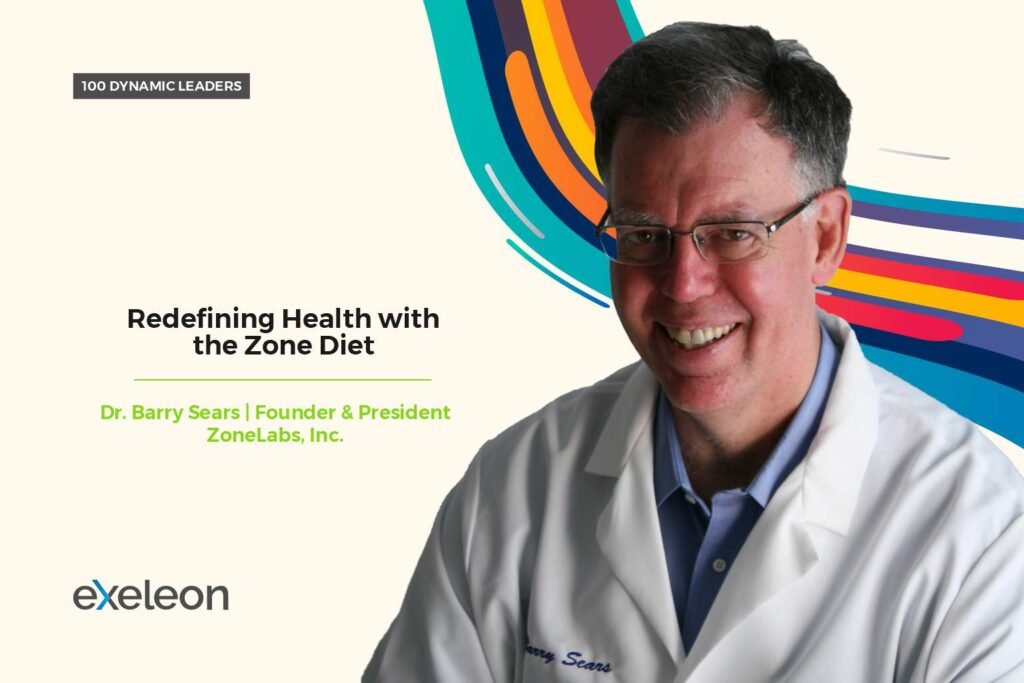This feature is part of our 100 Most Dynamic Leaders of 2023. Check out the entire issue and listing by clicking on this link.
Unyielding curiosity, a drive to impact lives, and a deep commitment to science. These attributes not only define Dr. Barry Sears but also lay the foundation of his life’s work — an endeavor to understand and harness the power of food and human metabolism.
With decades of meticulous research under his belt, Dr. Sears presents a refreshing perspective on how our dietary choices impact our health span and overall well-being.
A proponent of the Zone diet, Dr. Sears views food as a powerful drug capable of addressing a myriad of health concerns. His assertions stem from an intensive study into insulin resistance — a key factor he identifies as the underlying cause of many chronic diseases.
Can you give us a brief understanding of the Zone Diet?
The Zone diet was developed and patented as a drug to treat insulin resistance. Insulin resistance is not a disease per se, but it indicates that your metabolism is disrupted. Your metabolism controls your existence by converting food into energy, maintaining your immune system, orchestrating gene expression, repairing damaged tissue, and determining your rate of aging.
Many chronic conditions, such as obesity, diabetes, heart disease, Alzheimer’s, and others, are strongly associated with increased insulin resistance. Therefore, developing insulin resistance is the first step toward developing chronic disease at an earlier age.
The Zone diet treats food like a drug to be taken at the correct dose and at the right time to reduce, if not eliminate, insulin resistance. Rather than one drug for one disease, you can have one dietary system applicable to addressing the underlying cause of many diseases. I describe this field as Metabolic Engineering as it can personalized to the individual regardless of their diet philosophy using simple blood testing.
What are the benefits of being in the Zone?
The most important benefit is an improved health span. Health span is your maximum lifespan minus years of disability caused by chronic disease. Even though we are living longer, our health span is decreasing despite massive expenditures on health care. The efficiency of your metabolism is the primary factor that controls your health span. Thus, the reduction, if not elimination, of insulin resistance is a necessary first step to maintain wellness.
A simple blood test can measure your level of insulin resistance. If insulin resistance is absent, then your health future is bright. However, once you develop insulin resistance, your health future becomes much bleaker. Thus, the absence of insulin resistance is the medical definition of being in the Zone.
How are you helping people slow down their age and reach the Zone in an easier manner?
Medical research is only beneficial if it leads to an increase in your health span. No drug can reprogram your metabolism to get you to the Zone, but your diet can. Thus, being in the Zone makes every drug used to treat symptoms of a chronic disease associated with insulin resistance work better at lower doses. Unfortunately, reducing calorie intake will have the most significant impact on reducing insulin resistance.
Changing dietary habits is incredibly difficult. That is why I had to return to my earlier research in developing cancer drug delivery systems to create new food technologies to control hunger. These new technologies not only allow the production of food products to control appetite but also make it possible to practice calorie restriction for a lifetime without hunger or fatigue by eating the foods you enjoy (i.e., pizza, pasta, and pastries).
The biochemical pathways these new foods use to stop hunger are the same as those used by the latest generation of injectable weight loss drugs but without their side effects or costs. Frankly, developing this food technology was a far more significant challenge than enhancing the delivery of cancer drugs.
Having worked with hundreds of people, released multiple best-selling books, authored over 50 scientific articles, and recognized globally as one of the leading medical researchers, how do you look back at your journey thus far?
It has been a fascinating journey, starting with understanding the dynamics of lipids at the molecular level, moving on to studying the role of lipids in heart disease, then applying that knowledge to the development of patented cancer drug delivery systems, and finally improving the dietary control of human metabolism through Metabolic Engineering.
This journey would not have been possible without that insatiable desire for discovery and a willingness to take significant risks. Yet if the goal is noble enough (like increasing health span), then it is much easier to handle such risks and keep moving forward.
What would be your biggest advice for individuals struggling to maintain a healthy diet?
If you struggle with excess weight, have low physical and mental energy, have an existing chronic disease, or are concerned about aging, your problem is most likely associated with increased insulin resistance. I have spent the last 40 years seeking to understand how the diet can be used to reduce insulin resistance and maintain wellness for a longer time. The basic concepts of the Zone diet, enhanced with my newest food technology to restrict calories without hunger or fatigue, can make that goal a reality.
Our initial published clinical results using these foods in overweight and obese individuals demonstrated excellent dietary compliance, resulting in a significant loss of excess body fat, increased muscle mass, and a dramatic reduction in insulin resistance under placebo-controlled conditions. Upcoming clinical trials with type 2 diabetics will either confirm the potential for its use in every chronic disease associated with insulin resistance or send me back to the drawing board to keep refining my concepts.
What according to you makes one a dynamic leader?
I believe a dynamic leader must have an insatiable desire for discovery. This means constantly asking how things work and then finding opportunities to apply that acquired knowledge. This also means not being afraid to take the necessary risks and experience potential failures to achieve a desired goal. You must also have thick skin to handle the criticism to achieve that desired goal and demonstrate humility should you succeed. Finally, the long-term measure of success should be based on how well you improve the welfare of others instead of focusing on personal goals such as fame, wealth, or power.
How do you integrate the same thought into your leadership?
You always lead by example in all phases of the business. My company is science-based. In my case, I need to understand the complexity of human metabolism at the molecular level. Much of my time is spent pouring over the newest research, looking for dietary connections that can help maintain your metabolism to work at maximum efficiency. This is the discovery phase. The more difficult challenge is applying that knowledge to develop new dietary products to reprogram a disrupted metabolism. This is the application phase of discovery.
Now, the risk is higher as the chances of failure are significant. Furthermore, since these are dietary products, you had better be a product of the product yourself before even considering selling it to others. Once you have the products, then you must market the products based on science, not hype. This is when you need a very thick skin because if you are successful, you will upset a lot of existing food and pharmaceutical interests. Most importantly, you treat everyone in your organization as an extended family, not employees.
Finally, what is your vision going forward? What developments are you most excited about?
I see the future of medicine focused on maintaining wellness instead of simply treating the symptoms of chronic disease. That vision starts with dietary control of insulin resistance, which translates into better metabolic control and a longer health span.
The two most exciting areas of future medical research will be the control of gene expression through epigenetics and the removal of senescent cells that drive aging. Both processes are under robust metabolic control. Hippocrates was correct when he said 2,500 years ago, “Let food be your medicine and let medicine be your food.” It’s taken a long time to understand his wisdom because he spoke about the dietary control of metabolism.










